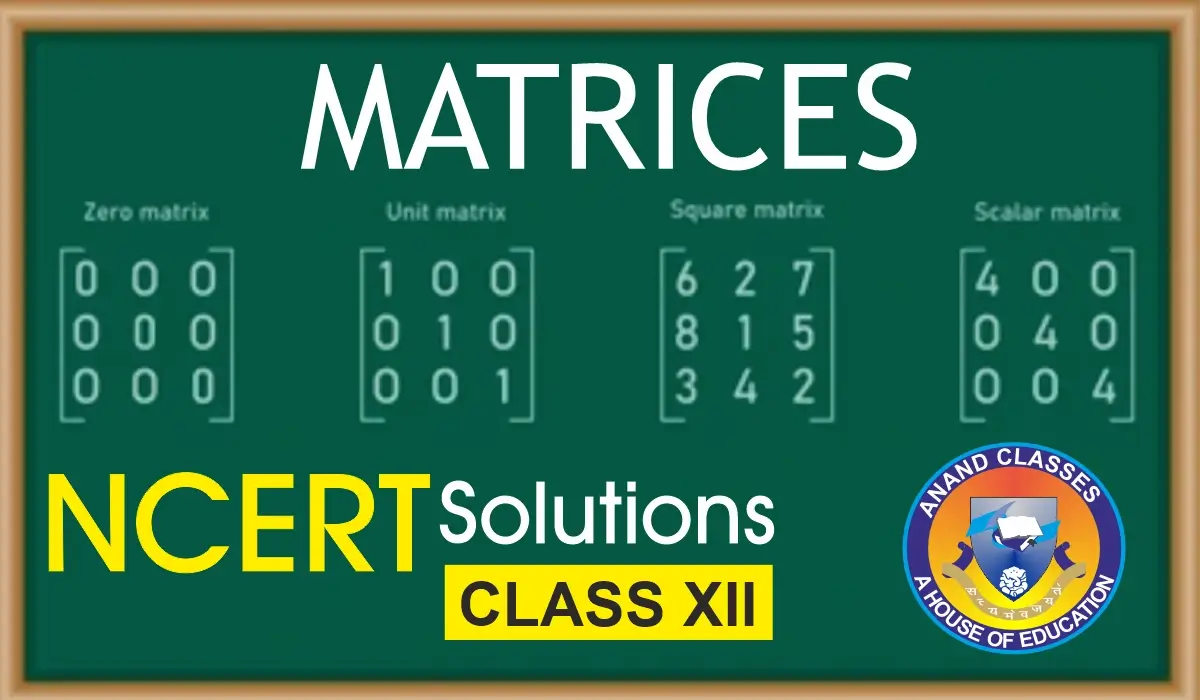Anand Classes provides NCERT Solutions for Class 11 Maths Chapter 7 – Binomial Theorem of Exercise 7.1 with step-by-step solutions, formula-based explanations, and concept clarity as per the latest CBSE and NCERT syllabus. These Class 11 Binomial Theorem solutions include the Binomial Theorem for positive integral indices, general term, middle term, and expansion of (a + b)ⁿ, helping students develop a solid foundation in algebraic expressions and powers. Each question is solved systematically for better understanding and exam confidence, making it highly useful for school exams, JEE, NDA, CUET, and other competitive exams. Click the print button to download study material and notes in PDF format.
Question 1 : Expand: $(1 – 2x)^5$
Solution :
According to the binomial theorem:
$a = 1$, $b = 2x$, $n = 5$
Using the formula:
$$ (a – b)^n = \sum_{k=0}^{n} (-1)^k \;{}^nC_k \;a^{n-k} \;b^k $$
We get:
$ (1 – 2x)^5 = {}^5C_0(1)^5 – {}^5C_1(1)^4(2x) + {}^5C_2(1)^3(2x)^2 – {}^5C_3(1)^2(2x)^3 + {}^5C_4(1)(2x)^4 – {}^5C_5(2x)^5 $
Simplify each term:
$$(1 – 2x)^5 = 1 – 5(2x) + 10(4x^2) – 10(8x^3) + 5(16x^4) – 32x^5$$
$$(1 – 2x)^5 = 1 – 10x + 40x^2 – 80x^3 + 80x^4 – 32x^5$$
Question 2 : Expand: $\left(\dfrac{2}{x} – \dfrac{x}{2}\right)^5$
Solution :
$a = \dfrac{2}{x}$, $b = \dfrac{x}{2}$, $n = 5$
$ (\frac{2}{x} – \frac{x}{2})^5 = {}^5C_0(\frac{2}{x})^5 – {}^5C_1(\frac{2}{x})^4(\frac{x}{2}) + {}^5C_2(\frac{2}{x})^3(\frac{x}{2})^2 – {}^5C_3(\frac{2}{x})^2(\frac{x}{2})^3 + {}^5C_4(\frac{2}{x})(\frac{x}{2})^4 – {}^5C_5(\frac{x}{2})^5 $
Simplify each term:
$$ (\frac{2}{x} – \frac{x}{2})^5 = \frac{32}{x^5} – 5 \cdot \frac{16}{x^4} \cdot \frac{x}{2} + 10 \cdot \frac{8}{x^3} \cdot \frac{x^2}{4} – 10 \cdot \frac{4}{x^2} \cdot \frac{x^3}{8} + 5 \cdot \frac{2}{x} \cdot \frac{x^4}{16} – \frac{x^5}{32} $$
$$ (\frac{2}{x} – \frac{x}{2})^5 = \frac{32}{x^5} – \frac{40}{x^3} + \frac{20}{x} – 5x + \frac{5x^3}{8} – \frac{x^5}{32} $$
Question 3 : Expand: $ (2x – 3)^6 $
Solution :
$a = 2x$, $b = 3$, $n = 6$
$ (2x – 3)^6 = {}^6C_0 (2x)^6 – {}^6C_1 (2x)^5 (3) + {}^6C_2 (2x)^4 (3)^2 – {}^6C_3 (2x)^3 (3)^3 + {}^6C_4 (2x)^2 (3)^4 – {}^6C_5 (2x) (3)^5 + {}^6C_6 (3)^6 $
Simplify each term:
$(2x – 3)^6 = 64x^6 – 6 \cdot (32x^5 \cdot 3) + 15 \cdot (16x^4 \cdot 9) – 20 \cdot (8x^3 \cdot 27) + 15 \cdot (4x^2 \cdot 81) – 6 \cdot (2x \cdot 243) + 729 $
Final simplified form:
$(2x – 3)^6 =64x^6 – 576x^5 + 2160x^4 – 4320x^3 + 4860x^2 – 2916x + 729$
Question 4 : Expand: $\left(\dfrac{x}{3} + \dfrac{1}{x}\right)^5$
Solution :
$a = \dfrac{x}{3}$, $b = \dfrac{1}{x}$, $n = 5$
$ \left(\frac{x}{3} + \frac{1}{x}\right)^5 = {}^5C_0 \left(\frac{x}{3}\right)^5 + {}^5C_1 \left(\frac{x}{3}\right)^4 \left(\frac{1}{x}\right) + {}^5C_2 \left(\frac{x}{3}\right)^3 \left(\frac{1}{x}\right)^2 + {}^5C_3 \left(\frac{x}{3}\right)^2 \left(\frac{1}{x}\right)^3 + {}^5C_4 \left(\frac{x}{3}\right) \left(\frac{1}{x}\right)^4 + {}^5C_5 \left(\frac{1}{x}\right)^5 $
Simplify each term:
$ \left(\frac{x}{3} + \frac{1}{x}\right)^5 =\frac{x^5}{243} + 5 \cdot \frac{x^4}{81} \cdot \frac{1}{x} + 10 \cdot \frac{x^3}{27} \cdot \frac{1}{x^2} + 10 \cdot \frac{x^2}{9} \cdot \frac{1}{x^3} + 5 \cdot \frac{x}{3} \cdot \frac{1}{x^4} + \frac{1}{x^5} $
Final simplified form:
$$
\frac{x^5}{243} + \frac{5x^3}{81} + \frac{10x}{27} + \frac{10}{9x} + \frac{5}{3x^3} + \frac{1}{x^5}
$$
Question 5 : Expand: $\left(x + \frac{1}{x}\right)^6$
Solution :
$a = x$, $b = \frac{1}{x}$, $n = 6$
$ \left(x + \frac{1}{x}\right)^6 = {}^6C_0 x^6 + {}^6C_1 x^5 \left(\frac{1}{x}\right) + {}^6C_2 x^4 \left(\frac{1}{x}\right)^2 + {}^6C_3 x^3 \left(\frac{1}{x}\right)^3 + {}^6C_4 x^2 \left(\frac{1}{x}\right)^4 + {}^6C_5 x \left(\frac{1}{x}\right)^5 + {}^6C_6 \left(\frac{1}{x}\right)^6 $
Simplify each term:
$ \left(x + \frac{1}{x}\right)^6 = x^6 + 6 \cdot (x^5 \cdot \frac{1}{x}) + 15 \cdot (x^4 \cdot \frac{1}{x^2}) + 20 \cdot (x^3 \cdot \frac{1}{x^3}) + 15 \cdot (x^2 \cdot \frac{1}{x^4}) + 6 \cdot (x \cdot \frac{1}{x^5}) + \frac{1}{x^6} $
Final simplified form:
$$
x^6 + 6x^4 + 15x^2 + 20 + \frac{15}{x^2} + \frac{6}{x^4} + \frac{1}{x^6}
$$
Question 6 : Evaluate: $96^3$ using the binomial theorem
Solution :
Express $96$ as $(100 – 4)$:
$$
96^3 = (100 – 4)^3
$$
Using the binomial theorem:
$$
(100 – 4)^3 = {}^3C_0 (100)^3 – {}^3C_1 (100)^2 (4) + {}^3C_2 (100)(4)^2 – {}^3C_3 (4)^3
$$
Simplify each term:
$$
(100 – 4)^3 = 100^3 – 3 \cdot 100^2 \cdot 4 + 3 \cdot 100 \cdot 16 – 64
$$
$$
(100 – 4)^3 = 1000000 – 120000 + 4800 – 64
$$
$$
96^3= 884736
$$
Question 7 : Evaluate: $102^5$ using the binomial theorem
Solution :
Express $102$ as $(100 + 2)$:
$$
102^5 = (100 + 2)^5
$$
Using the binomial theorem:
$ (100 + 2)^5 = {}^5C_0 (100)^5 + {}^5C_1 (100)^4 (2) + {}^5C_2 (100)^3 (2)^2 + {}^5C_3 (100)^2 (2)^3 + {}^5C_4 (100)(2)^4 + {}^5C_5 (2)^5 $
Simplify each term:
$ (100 + 2)^5 = 100^5 + 5 \cdot 100^4 \cdot 2 + 10 \cdot 100^3 \cdot 4 + 10 \cdot 100^2 \cdot 8 + 5 \cdot 100 \cdot 16 + 32 $
$ (100 + 2)^5 = 10000000000 + 1000000000 + 40000000 + 80000 + 8000 + 32 $
$ 102^5 = 11040808032 $
Question 8 : Evaluate: $101^4$ using the binomial theorem
Solution :
Express $101$ as $(100 + 1)$:
$$
101^4 = (100 + 1)^4
$$
Using the binomial theorem:
$ (100 + 1)^4 = {}^4C_0 100^4 + {}^4C_1 100^3 (1) + {}^4C_2 100^2 (1)^2 + {}^4C_3 100 (1)^3 + {}^4C_4 (1)^4 $
Simplify each term:
$$
(100 + 1)^4 = 100^4 + 4 \cdot 100^3 + 6 \cdot 100^2 + 4 \cdot 100 + 1
$$
$$
(100 + 1)^4 = 100000000 + 400000 + 60000 + 400 + 1
$$
$$
101^4 = 1040604001
$$
Question 9 : Evaluate: $99^5$ using the binomial theorem
Solution :
Express $99$ as $(100 – 1)$:
$$
99^5 = (100 – 1)^5
$$
Using the binomial theorem:
$ (100 – 1)^5 = {}^5C_0 100^5 – {}^5C_1 100^4 (1) + {}^5C_2 100^3 (1)^2 – {}^5C_3 100^2 (1)^3 + {}^5C_4 100 (1)^4 – {}^5C_5 (1)^5 $
Simplify each term:
$$
(100 – 1)^5 = 100^5 – 5 \cdot 100^4 + 10 \cdot 100^3 – 10 \cdot 100^2 + 5 \cdot 100 – 1
$$
$$
(100 – 1)^5 = 1000000000 – 500000000 + 10000000 – 100000 + 500 – 1
$$
$$
99^5 = 950990499
$$
Question 10 : Using the binomial theorem, indicate which number is larger: $(1.1)^{10000}$ or $1000$
Solution :
Express $1.1$ as $(1 + 0.1)$:
$$(1.1)^{10000} = (1 + 0.1)^{10000}$$
Using the binomial theorem:
$ (1 + 0.1)^{10000} = {}^{10000}C_0 (1)^{10000} + {}^{10000}C_1 (1)^{9999} (0.1) + \text{other positive terms} $
Simplify the first few terms:
$$
(1 + 0.1)^{10000} = 1 + 1000 + \text{other positive terms}
$$
$$
(1 + 0.1)^{10000} = 1001 + \text{other positive terms} > 1000
$$
Hence,
$$(1.1)^{10000} > 1000$$
Question 11 : Find $ (a + b)^4 – (a – b)^4 $. Hence, evaluate $ (\sqrt{3} + \sqrt{2})^4 – (\sqrt{3} – \sqrt{2})^4 $.
Solution :
Using the binomial theorem:
$$(a + b)^4 = {}^4C_0 a^4 + {}^4C_1 a^3 b + {}^4C_2 a^2 b^2 + {}^4C_3 a b^3 + {}^4C_4 b^4$$
$$(a – b)^4 = {}^4C_0 a^4 – {}^4C_1 a^3 b + {}^4C_2 a^2 b^2 – {}^4C_3 a b^3 + {}^4C_4 b^4$$
Subtracting:
$ (a + b)^4 – (a – b)^4 = ({}^4C_0 a^4 + {}^4C_1 a^3 b + {}^4C_2 a^2 b^2 + {}^4C_3 a b^3 + {}^4C_4 b^4) – ({}^4C_0 a^4 – {}^4C_1 a^3 b + {}^4C_2 a^2 b^2 – {}^4C_3 a b^3 + {}^4C_4 b^4) $
$$
(a + b)^4 – (a – b)^4 = 2 ({}^4C_1 a^3 b + {}^4C_3 a b^3)
$$
Simplify the coefficients:
$$
(a + b)^4 – (a – b)^4 = 2 (4 a^3 b + 4 a b^3) = 8ab (a^2 + b^2)
$$
Substitute $a = \sqrt{3}$ and $b = \sqrt{2}$:
$$(\sqrt{3} + \sqrt{2})^4 – (\sqrt{3} – \sqrt{2})^4 = 8 (\sqrt{3})(\sqrt{2}) ((\sqrt{3})^2 + (\sqrt{2})^2)$$
$$
(\sqrt{3} + \sqrt{2})^4 – (\sqrt{3} – \sqrt{2})^4 = 8 \sqrt{6} (3 + 2)
$$
$$
(\sqrt{3} + \sqrt{2})^4 – (\sqrt{3} – \sqrt{2})^4 = 40 \sqrt{6}
$$
Question 12 : Find $(x + 1)^6 + (x – 1)^6$. Hence or otherwise evaluate $(\sqrt{2} + 1)^6 + (\sqrt{2} – 1)^6$.
Solution :
Using the binomial theorem:
$$(x + 1)^6 = {}^6C_0 x^6 + {}^6C_1 x^5 + {}^6C_2 x^4 + {}^6C_3 x^3 + {}^6C_4 x^2 + {}^6C_5 x + {}^6C_6$$
$$(x – 1)^6 = {}^6C_0 x^6 – {}^6C_1 x^5 + {}^6C_2 x^4 – {}^6C_3 x^3 + {}^6C_4 x^2 – {}^6C_5 x + {}^6C_6$$
Add the two expressions:
$ (x + 1)^6 + (x – 1)^6 = ({}^6C_0 x^6 + {}^6C_1 x^5 + {}^6C_2 x^4 + {}^6C_3 x^3 + {}^6C_4 x^2 + {}^6C_5 x + {}^6C_6) + ({}^6C_0 x^6 – {}^6C_1 x^5 + {}^6C_2 x^4 – {}^6C_3 x^3 + {}^6C_4 x^2 – {}^6C_5 x + {}^6C_6) $
$$
(x + 1)^6 + (x – 1)^6 = 2 ({}^6C_0 x^6 + {}^6C_2 x^4 + {}^6C_4 x^2 + {}^6C_6)
$$
Simplify the coefficients:
$$
(x + 1)^6 + (x – 1)^6 = 2 (x^6 + 15 x^4 + 15 x^2 + 1) \quad \text{-(1)}
$$
Now, let $x = \sqrt{2}$:
$$(\sqrt{2} + 1)^6 + (\sqrt{2} – 1)^6 = 2 \big((\sqrt{2})^6 + 15 (\sqrt{2})^4 + 15 (\sqrt{2})^2 + 1 \big)$$
$$
(\sqrt{2} + 1)^6 + (\sqrt{2} – 1)^6 = 2 (8 + 60 + 30 + 1)
$$
$$
(\sqrt{2} + 1)^6 + (\sqrt{2} – 1)^6 = 2 (99)
$$
$$
(\sqrt{2} + 1)^6 + (\sqrt{2} – 1)^6 = 198
$$
Question 13 : Show that $ 9^{n+1} – 8^n – 9 $ is divisible by $64$, whenever $n$ is a positive integer.
Solution :
To prove:
$$
9^{n+1} – 8^n – 9 = 64 k, \quad \text{where $k$ is some natural number}
$$
Express $9^{n+1}$ as $(1 + 8)^{n+1}$ and apply the binomial theorem:
$ (1 + 8)^{n+1} = {}^{n+1}C_0 \cdot 1^{n+1} + {}^{n+1}C_1 \cdot 1^n \cdot 8 + {}^{n+1}C_2 \cdot 1^{n-1} \cdot 8^2 + \dots + {}^{n+1}C_{n+1} \cdot 8^{n+1} $
Simplify the first few terms:
$ 9^{n+1} = 1 + (n+1) \cdot 8 + 8^2 \big[ {}^{n+1}C_2 + {}^{n+1}C_3 \cdot 8 + \dots + {}^{n+1}C_{n+1} \cdot 8^{n-1} \big] $
$$
9^{n+1} = 9 + 8 n + 64 \big[ {}^{n+1}C_2 + {}^{n+1}C_3 \cdot 8 + \dots + {}^{n+1}C_{n+1} \cdot 8^{n-1} \big]
$$
$$
9^{n+1} – 9 – 8 n = 64 \big[ {}^{n+1}C_2 + {}^{n+1}C_3 \cdot 8 + \dots + {}^{n+1}C_{n+1} \cdot 8^{n-1} \big]
$$
Hence:
$$
9^{n+1} – 8^n – 9 = 64 k
$$
Where $k$ is a natural number.
Therefore, $9^{n+1} – 8^n – 9$ is divisible by $64$ whenever $n$ is a positive integer.
Question 14 : Prove that $$ \sum_{r=0}^{n} 3^r {}^nC_r = 4^n $$
Solution :
The binomial theorem states:
$$
(a + b)^n = \sum_{k=0}^{n} {}^nC_k\; a^{,n-k} \;b^k
$$
Here, we take:
$$
a = 1, \quad b = 3
$$
Then:
$$
(1 + 3)^n = \sum_{r=0}^{n} {}^nC_r \; 1^{,n-r} \;3^r
$$
Since $1^{,n-r} = 1$, this simplifies to:
$$
(1 + 3)^n = \sum_{r=0}^{n} {}^nC_r \; 3^r
$$
$$
4^n = \sum_{r=0}^{n} {}^nC_r \; 3^r
$$
Term-by-Term Expansion
For small $n$, say $n = 4$, we can expand the sum:
$$
\sum_{r=0}^{4} {}^4C_r \; 3^r = {}^4C_0 3^0 + {}^4C_1 3^1 + {}^4C_2 3^2 + {}^4C_3 3^3 + {}^4C_4 3^4
$$
Compute each term:
- ${}^4C_0 3^0 = 1 \cdot 1 = 1$
- ${}^4C_1 3^1 = 4 \cdot 3 = 12$
- ${}^4C_2 3^2 = 6 \cdot 9 = 54$
- ${}^4C_3 3^3 = 4 \cdot 27 = 108$
- ${}^4C_4 3^4 = 1 \cdot 81 = 81$
Add them together:
$$
1 + 12 + 54 + 108 + 81 = 256
$$
Also:
$$
(1 + 3)^4 = 4^4 = 256
$$
✅ Matches perfectly!
General Conclusion
Hence, for any positive integer $n$:
$$
\sum_{r=0}^{n} 3^r \; {}^nC_r = 4^n
$$
This term-by-term expansion clearly shows how each term in the sum contributes to the final result.


